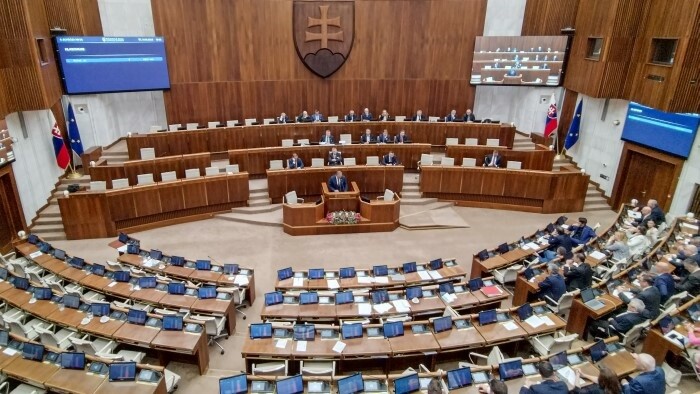The general government deficit is expected to fall to 4.7 percent of gross domestic product (GDP) next year from this year's expected 5.8 percent of GDP, as MPs approved the law on the state budget for next year on Tuesday.
The state budget deficit should thus amount to €6.4 billion. MPs also acknowledged the general government budget for 2025-2027 with slight adjustments when compared to the government's original draft.
The state budget law was backed by all 79 MPs supporting the governing coalition, while the remaining 58 of the 137 lawmakers present for the vote were against.
Total state budget revenues for next year are projected at €27.6 million, with expenditures at €34 billion. Public administration revenues should reach €59.9 billion or 42.8 percent of GDP. The total spending of the public sector is budgeted at €66.5 billion or 47.5 percent of GDP.
The deficit should continue to decline in the upcoming years, in particular to 3.7 percent of GDP in 2026 and to 3 percent of GDP in 2027. Additional consolidation measures equalling 1.9 percent of GDP or €2.8 billion need to be taken by 2027 to achieve these targets. "The consolidation measures presented by the government have ensured that the target for 2025 will be achieved. For the year 2026, the currently set budget deficit is higher by 0.4 percent of GDP, and in 2027 [it is higher] by 1.9 percent of GDP," said the Finance Ministry.
The coalition leaders praised the approval of the state budget, with Smer-SD and Premier Robert Fico, Hlas-SD leader and Interior Minister Matus Sutaj Estok and Slovak National Party (SNS) leader and House Vice-chair Andrej Danko expressing their thanks for the budget's approval at a joint press conference shortly after the vote.
"I thank the [finance] minister for submitting a draft that was found by the European Commission (EC) to be realistic and helpful in terms of consolidating public finances. I thank the chairmen of the coalition parties for their support. You've seen that 79 MPs backed the budget, which means that Parliament is functional and we are going on," stated the premier.
The budget's submitter, Finance Minister Ladislav Kamenicky (Smer-SD), also views Tuesday's approval positively. "Last but not least, many thanks to my colleagues from the Finance Ministry, who spent many nights, many months on what is the result of today's vote. I am very pleased that the Slovak Republic has a budget for next year that the European Commission evaluated as one of the eight best among all EU countries," he said.
The approved law on the state budget for next year is one of the worst budgets in Slovakia's history, stated MP for SaS Marian Viskupic on Tuesday.
"In my opinion, this is one of the worst budgets in Slovakia's history. It provides exactly what Slovakia doesn't need - increases in levies, taxes and new taxes; but exactly what Slovakia does need, that is, reducing red tape, reducing expenditures, there's nothing like that. On the contrary, budget expenditures are going up significantly. This budget has turned people, companies and tradesmen into cash cows," said Viskupic.
The MP added that the state wants to increase its budget revenues by more than 20 percent in a single year, which is unacceptable. According to Viskupic, the government has proven that it doesn't value people, companies or value creators. "It considers them only to be those who have to pay and pay, but the government doesn't spare on itself at all," he added.
The governing coalition has approved a budget of high prices, chaos and the past, the opposition Progressive Slovakia (PS) party stated in response to the approval of the state budget, adding that it's understandable that practically the whole of society, from trade unionists, teachers, health-care workers to police officers and people from culture protested against such a budget.
"The whole of Slovakia will have to tighten their belts, and the worst thing is that it will be completely unnecessary. Fico's government will squander everything. It won't reduce the debt, it won't invest in education or health care. What they collect, they will immediately eat up in higher salaries, annuities and private jets. It's a missed opportunity, just like the entire 13 years of Smer-SD government," said PS chair Michal Simecka.
According to PS MP Stefan Kiss, despite the drastic consolidation, the public deficit won't become lower next year, but will grow instead.
Source: TASR

